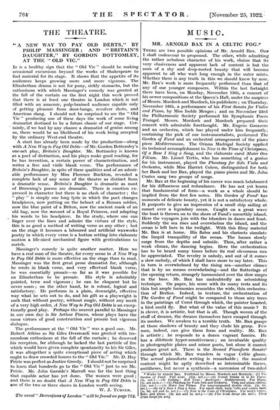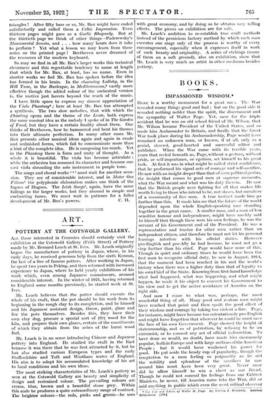MR. ARNOLD BAX IN A CELTIC FOG.*
THERE are two possible opinions of Mr. Arnold Bax. One I shall endeavour to propound. The other, while admitting the rather nebulous character of his work, claims that its very elusiveness and apparent lack of content is but the aura of a shy and deep-rooted beauty that will become apparent to all who wait long enough in the outer mists. Whether there is any truth in this we should know by now. Mr. Bas's work is more frequently performed than that of any of our younger composers. Within the last fortnight there have been, on Monday, November 13th, a concert of his newer compositions at the Queen's Hall, under the auspices
of Messrs. Murdoch and Murdoch, his publishers ; on Thursday, November 16th, a performance of his First Sonata for Violin and Piano, by Miss Isolde Menges ; and on November 23rd the Philharmonic Society performed his Symphonic Poem Tintagel. Messrs. Murdoch and Murdoch prepared their
concert with admirable forethought. Mr. Eugene Goossens
and an orchestra, which has played under him frequently, containing the pick of our instrumentalists, performed The Garden of Fand and an orchestral arrangement of the piano piece Mediterranean. The Oriana Madrigal Society applied its technical accomplishment to Now is the Time of Christymas, Of a Rose I Sing a Song, and the elaborate carol Mater Ora Filium. Mr. Lionel Tertis, who has something of a genius for his instrument, played the Phantasy for Solo Viola and Orchestra, while Miss Harriet Cohen, distinguished for both her Bach and her Bax, played the piano pieces and Mr. John Coates sang two groups of songs.
Mr. Bax at the beginning of his career was much belaboured for his diffuseness and redundance. He has not yet learnt that fundamental of form—a work as a whole should be
implied from the first few notes. His Garden of Fand' has moments of delicate beauty, yet it is not a satisfactory whole.
It purports to give an impression of a small ship sailing at sunset over a legendary ocean. Caught on a great wave the boat is thrown on to the shore of Fand's unearthly island.
Here the voyagers join with the islanders in dance and feast.
Suddenly the sea rises and overwhelms the island, and the ocean is left bare in the twilight. With this filmy material Mr. Bax is at home. His flutes and his clarinets simulate the limpid tranquillity of the ocean. The basses slowly surge from the depths and subside. Then, after rather a weak climax, the dancing begins. Here the orchestration has to be heard many times before its real cleverness can be appreciated. The revelry is unholy, and out of it comes a slow melody, of which I shall have more to say later. This in turn is overwhelmed by the rising sea—another climax that is by no means overwhelming—and the flutterings of the opening return, strangely harmonized over the slow surges in the bass. Mr. Bax has undoubtedly an astonishing technique. On paper, his score with its many rests and its thin but ample harmonies resembles the wide, thin orchestra- tion of Berlioz. Indeed, in texture, the orchestration of
The Garden of Fand might be compared to those airy trees in the paintings of Corot through which, the painter boasted, a bird could fly. But what of the value of this music ? It is clever, it is artistic, but that is all. Though woven of the stuff of dreams, the dreams themselves have escaped through its meshes. We awaken to a terrible truth. Mr. Bax grasps at those shadows of beauty and they elude his grasp. Few men, indeed, can give them form and reality. Mr. Bax is artistic ; he responds to a dozen vagrant fancies. He has a dilettante hyper-sensitiveness ; an invaluable quality in photographic plates and minor poets, but alone it cannot produce great art. There is the Second Pianoforte Sonata' through which Mr. Bax wanders in vague Celtic gloom. The actual pianoforte writing is remarkable ; the musical content might be aptly described as interminable theses, antitheses, but never a synthesis—a succession of two-sided • Works by Arnold Bax. Published by Messrs. Murdoch and Murdoch : (1) The Garden of Fatal. Full score. [25s. net.]—(2) Second Sonata in G for Piano. [ne. net.]—(3) Lullaby ; Hill Tune ; Burlesque ; Mediterranean. For Plano. [28. net each.]--(4) Phantasy for Viola Solo and Orchestra. Viola and piano edition. [108. net.]—(5) Mater Ora Filium. For unaccompanied double choir. [2s. 6d. net.]—(8) Of a Rose I Sing a Song. For small choir, harp, 'cello and contra bass. [2s. 8d. net and 18. net.]—(7) Now is the Time of Christymas. For men's voice.,, flute, and Plana. [28. net and le. net.1—(S) Floe Irish Songs Os. net] Three The usual " Ikerealions of London " will be found on page 772. /so Songs [ s. n J. triangles ! After fifty bars or so, Mr. Bax might have ended satisfactorily and called them a Celtic Impression. Even thirteen pages might pass as a Gaelic Rhapsody. But at the thirtieth page we think of other things—Paderewsky's Monumental Sonata, and . . . how many hours does it take to perform ? Yet what a lesson we may learn from those notes on the printed page ! Beethoven never dreamed of the resources of the modern keyboard.
So may we find in all Mr. Bax's larger works this technical cleverness and this regrettable tendency to name at length that which for Mr. Bax, at least, has no name. Even in shorter works we feel Mr. Bax has spoken before the idea has formed in his brain. In the charming Lullaby, in the Hill Tune, in the Burlesque, in Mediterrancan,s vastly more effective though the added colour of the orchestral version is, the motive just hovers beyond the reach of the music.
I have little space to express my sincere appreciation of the Viola Phantasy4 ; here at least Mr. Bax has attempted a synthesis. The two slow melodies, that with which the Phantasy opens and the theme of the Lento, both express the same musical idea as the melody I spoke of in The Garden of Fand, but they have a certain finality about them. One thinks of Beethoven, how he hammered and bent his themes into their ultimate perfection. In many other cases Mr. Bax presents other musical ideas again and again in crude and unfinished forms, which fail to communicate more than a hint of the complete idea. He is composing too much. Yet in the Phantasy there is form and unity of thought. - As a whole it is beautiful. The viola has become articulate : while the orchestra has assumed its character and become one vast viola shrouding the solo instrument in purple tone.
The songs and choral works 5 6 7 must Wait for another occa- sion. They are of considerable interest, and in Mater Ora Filium5 the polyphonic elaboration makes one think of the fugues of Hugues. The Irish Songs', again, have the same failings as the larger works; but they abound in simple and enchanting tunes. We must wait in patience for a fuller
development of Mr. Bax's powers. C. H.











































 Previous page
Previous page